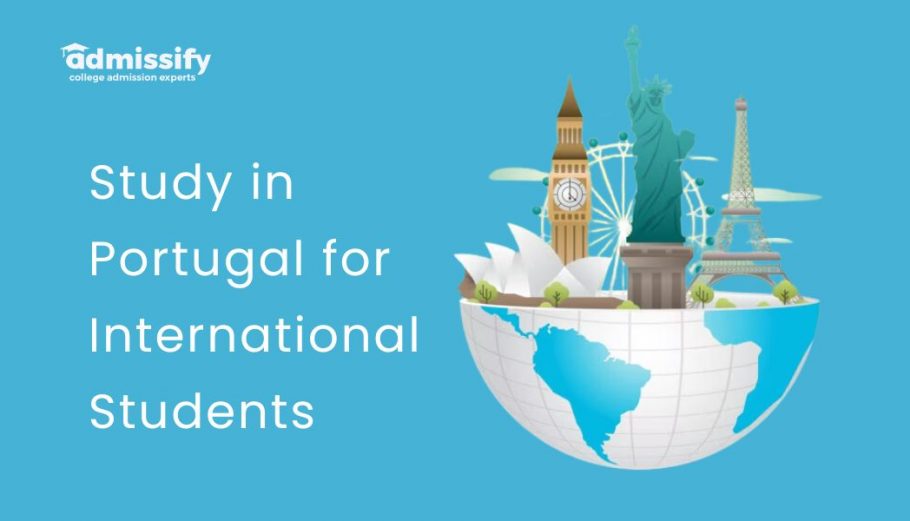Last Updated on September 23, 2024
Explore opportunities for international students in Portugal. Learn everything about studying in Portugal, including the best universities, programs, tuition, cost of living, scholarships, and application processes.
Portugal also has several famous universities. Some subjects are only taught at universities or colleges, but many overlapping subjects exist—for example, universities and polytechnics award engineering, management, and humanities degrees.
Since 2006, Portugal has implemented the Bologna Process in universities and schools encyclopedias, a European reform process to create a standard structure for higher education nationwide. Europe. Portuguese universities follow this structure and offer three levels. They are:
Portuguese universities offer a variety of degrees, from engineering to management and humanities. The baccalaureate, or licensure, degree usually lasts three to four years. The master’s degree, or mestrado, lasts one to two years. The doctoral degree, or duotoramento, usually lasts three years. Tuition fees in Portugal are relatively low. Public universities typically charge less than 1,500 EUR per year for bachelor’s and master’s programmes, while private universities can charge up to 4,000 EUR per year.
Universities The largest university in Portugal, the University of Lisbon (ULisboa), is in the country’s capital. Founded in 1911, the school currently has nearly 50,000 students. It covers a wide variety of topics and is highly regarded internationally.
Overview of Study in Portugal for International Students
| Aspect | Details |
| Popular Universities in Portugal | Universities of Lisbon, Porto, Coimbra, and Minho |
| Top Programs to Study in Portugal | Business administration, engineering, social sciences, arts, humanities, and information technology |
| Language of Instruction needed to study in Portugal | Portuguese (mainly), English (increasingly used for postgraduate courses) |
| Tuition Fees for universities in Portugal | Annual tuition ranges from €950 to €1,250 for undergraduate programs and €2,500 to €3,000 for postgraduate programs. |
| Living Costs to Study in Portugal | Approximately €700 to €1,000 per month (including accommodation, food, transportation, and other expenses). |
| Accommodation Options | University dormitories, private and shared apartments |
| Scholarships | Available to international students through universities, the Portuguese government, and other organisations. |
| Visa Requirements | Non-EU/EEA students require a student visa, which can be obtained from the Portuguese consulate or embassy. |
| Work Opportunities | Students can work part-time (up to 20 hours per week), and internship and graduate opportunities are available. |
| Health Insurance | Mandatory for all students; available through public or private providers. |
| Cultural Experience | Rich history, vibrant culture, stunning landscapes, and friendly people |
| Language Learning | Portuguese language courses are frequently available to international students at universities. |
What are the documents required to study for an international student?
To study in Portugal as an international student, The list of documents needed to Study in Portugal for International Students are as follows:
- Completed application form specific to the chosen university.
- A valid passport with at least six months’ validity from the intended entry date.
- Certified copies of previous academic records, including high school or undergraduate transcripts.
- Proof of graduation from previous educational institutions, such as a high school diploma or bachelor’s degree certificate.
- Proof of proficiency in Portuguese (e.g., CAPLE exam) is generally required for programs taught in Portuguese. For English-taught programs, IELTS or TOEFL scores are usually required.
- n essay detailing your academic interests, career goals, and reasons for choosing the specific program and university.
- Two or three letters from professors or employers attest to your academic and professional capabilities.
- A detailed resume highlighting your educational background, work experience, and other relevant activities.
- Recent photos are usually required for application forms and student ID cards.
- Proof of health insurance coverage is valid in Portugal.
- Evidence of sufficient financial means to support yourself during your stay in Portugal, such as bank statements, scholarship letters, or a sponsor’s affidavit.
- For non-EU/EEA students, a student visa application form is required, along with additional required documents (acceptance letter from the university, financial proof, health insurance proof, and accommodation proof).
How an international Student Can Apply to Study in Portugal?
It is easy for all the international students to apply for the Portugal universities. However, they will need to follow the steps given below:
- Universities and research programs: Find the right fit for your academic and career goals. This involves finding courses you like in college for career opportunities.
- Check admission requirements: Gather necessary documents, such as transcripts, resumes, curriculum vitae, letters of recommendation, and proof of language proficiency. Students must also have a valid proof of funds in their bank account.
- Prepare for entrance exams: If necessary, take tests such as the GRE or GMAT. Students must also appear for any other entrance exam to gain admission.
- Fill out the application form: Complete the forms on the university website or national platform. Be sure to add all relevant information. If you write something untrue, it will adversely affect your application.
- Meet the deadline: Usually, from February to May, the application for the intake period of September classes is mandatory. Students should also check the official website to ensure their documents are appropriately handled.
- Receive and confirm the offer: Confirm your location and pay the deposit if accepted. Students must also pay an application fee to have their application considered.
- Apply for a student visa: Submit an acceptance letter, proof of finances, health insurance, and other documents to the consulate. >Arrange accommodation and prepare: Book and familiarise yourself with Portuguese culture and language.
The list of the Top Universities in Portugal for International Students
| University | Rank |
| University of Lisbon | 356th |
| University of Porto | 295th |
| University of Aveiro | 454th |
| University of Coimbra | 438th |
| University of Minho | 651-700 |
| Polytechnic of Leiria | Not Ranked |
| University of Algarve | 801-1000 |
| Oporto Global University | Not Ranked |
| University of Beira Interior | 801-1000 |
best courses study in Portugal for international students
Some of the best courses to study are as follows:
- Doctor of Education
A Doctor of Education (EdD) focuses on the practical application of research to educational settings, aiming to improve educational practices and policies. It prepares leaders for roles in academia, administration, and policy-making.
- Law
Law studies encompass the rules created and enforced through social or governmental institutions to regulate behaviour. Law programs develop critical thinking, analytical skills, and an understanding of legal principles and systems, preparing students for legal practice or academia.
- Engineering
Engineering generally includes the application of science and mathematics to solve problems and design structures, systems, and processes. Moreover, the detailed course covers various branches, such as civil, mechanical, electrical, and chemical engineering, each focusing on specific technical challenges.
- Medical Studies
Medical studies prepare students for careers in healthcare, focusing on diagnosing, treating, and preventing diseases. The field requires training in medical sciences, clinical practices, and patient care.
- Business Studies
Business studies include the principles and practices of business, management, and economics. They help students gain skills in marketing, finance, human resources, and strategic planning, preparing them to take on different roles in the business world.
- Humanities
Humanities explore human culture, thought, and history through disciplines like literature, philosophy, history, and art. This field fosters critical thinking, creativity, and a deep understanding of human experiences and values.
- Media and Film
Media and cinema studies analyse media and cinema’s production, distribution and impact. This field includes aspects such as film theory, media history, production techniques, and the social role of media and entertainment.
- MS in Mathematics
An MS in Mathematics provides advanced knowledge of mathematical theories, methods, and applications. It prepares students for research, teaching, professional finance, technology, and engineering roles, emphasising problem-solving and analytical skills.
- Environmental Studies
Environmental studies examine the interaction between humans and the environment, aiming to find sustainable solutions to environmental issues. This interdisciplinary field covers ecology, conservation, policy, and ecological ethics.
- Applied Languages
Applied Linguistics focuses on the practical use of language skills in various professional contexts. This includes translation, interpretation, language teaching, cultural mediation, and improving communication in a globalised context.
Wrapping Up!!
Portugal has many prestigious universities and polytechnics offering various degrees, from engineering to management and humanities. The Bologna Process, a European reform process since 2006, has been implemented in these institutions. The country’s tuition fees are relatively low, with public universities charging less than 1,500 EUR per year for bachelor’s and master’s programs and private universities charging up to 4,000 EUR per year. Major international universities include the University of Lisbon, University of Porto, University of Coimbra, University of Minho, Polytechnic University of Leiria, University of the Algarve, World University of Porto and University of the Interior of Beira.
FAQs
Is education free for international students in Portugal?
No, education in Portugal is not accessible to international students. They are required to pay tuition fees, which vary by university and program type.
How much does it cost for international students to study in Portugal?
The cost to study in Portugal for international students ranges from €950 to €1,250 per year for undergraduate programs and €2,500 to €3,000 per year for postgraduate programs.
Is IELTS required for Portugal?
IELTS is often required for admission to English-taught programs in Portugal. Universities typically specify minimum score requirements on their official websites.
Is Portugal suitable for international students?
Yes, Portugal is suitable for international students. It offers affordable education, a rich cultural experience, and welcoming communities, making it an attractive destination for higher education.

Kanishka Garg specializes in crafting informative content on study abroad education. Her passion lies in simplifying the journey for students through SEO-optimized articles and blogs. Kanishka’s commitment to clear communication and her deep understanding of international admissions processes make her blogs essential for students aiming to gain insights into top universities worldwide. With Kanishka’s blogs, students can confidently get solutions to the complexities of applying to their dream universities and achieve their academic aspirations abroad.




